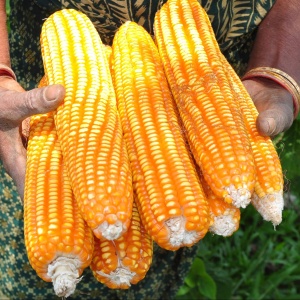
As global mean temperature rises due to climate change, the chance of multiple shocks in maize production occurring at the same time rises, due to greater variability in yields. The top four maize-producing countries are United States, China, Brazil, and Argentina. The chance of all four suffering a yield loss of more than 10% in the same year is presently almost zero, but rises to 6% for 2°C of warming and 87% for 4°C of warming. The study does not account for changing variability in temperature (only the increase in mean temperature), nor any gains from breeding heat-tolerant maize varieties.
Abstract
Climate-induced shocks in grain production are a major contributor to global market volatility, which creates uncertainty for cereal farmers and agribusiness and reduces food access for poor consumers when production falls and prices spike. Our study, by combining empirical models of maize production with future warming scenarios, shows that in a warmer climate, maize yields will decrease and become more variable. Because just a few countries dominate global maize production and trade, simultaneous production shocks in these countries can have tremendous impacts on global markets. We show that such synchronous shocks are rare now but will become much more likely if the climate continues to warm. Our results underscore the need for continued investments in breeding for heat tolerance.
Reference
Tigchelaar, M., Battisti, D.S., Naylor, R.L. and Ray, D.K., 2018. Future warming increases probability of globally synchronized maize production shocks. Proceedings of the National Academy of Sciences, 115 (26) pp.6644-6649.
Read the full paper here. See also the Foodsource resource How might climatic change affect food systems in the future?







Post a new comment »